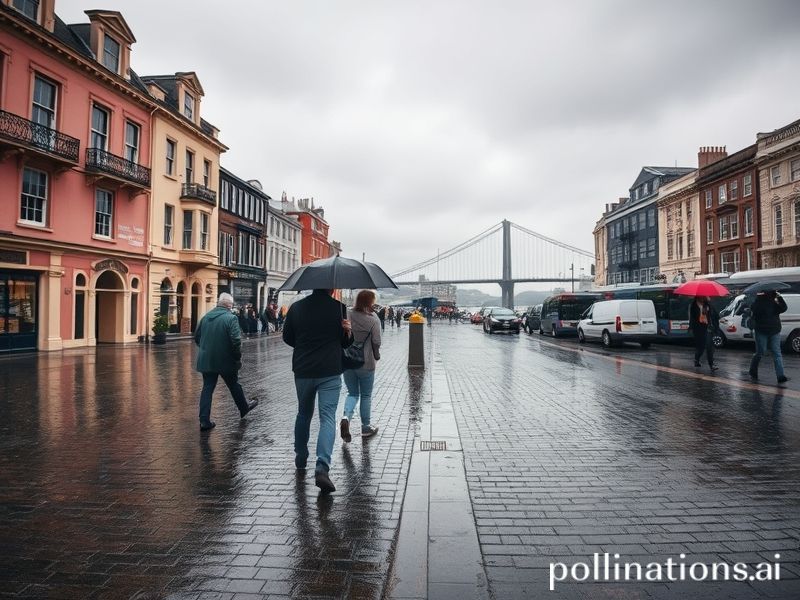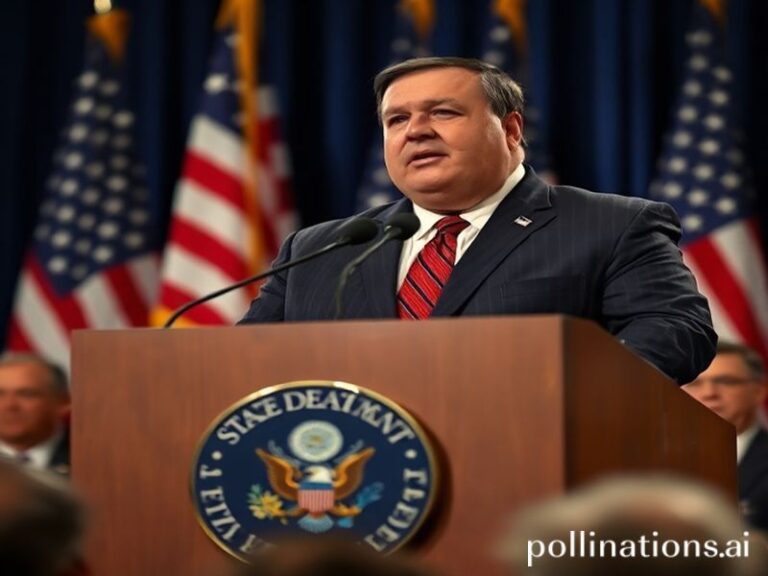Bristol’s Drizzle Goes Global: How One City’s Weather Became the World’s Worry
Weather Bristol: How a Drizzly English Backwater Became the Planet’s Atmospheric Punchline
By Dave’s Foreign Correspondent, still drying off in Gate 43
Let us begin with the obvious: the weather in Bristol, population 465,000 and shrinking faster than British diplomatic credibility, is not, in itself, interesting. It is grey, damp, and insistently mediocre—like a LinkedIn profile that reads “passionate about synergy.” Yet, thanks to the miracle of a warming planet and humanity’s irrepressible urge to turn every local drizzle into global drama, Bristol’s sky has become a sort of tragicomic barometer for the rest of us.
This week alone, Bristolians endured three seasons in the span of a single Tuesday. Morning commuters cycled through horizontal sleet that could exfoliate rhino hide; by lunchtime, Mediterranean sun broke through as if someone had mis-clicked on the climate settings; by teatime, fog rolled in thick enough to audition for a Sherlock reboot. If this sounds familiar, congratulations—you live on Earth in 2024. Bristol is merely the canary in the coal mine, except the canary is wearing a cagoule and tweeting about micro-plastics.
International observers—meaning anyone with Wi-Fi and a grudge—have latched onto Bristol for three geopolitically inconvenient reasons. First, the city’s micro-climate now changes faster than crypto regulations, offering climatologists a live-action demo of “what happens when the Gulf Stream has a mid-life crisis.” Second, Bristol’s mayor, a man who once declared a “climate emergency” while cutting funding for bus lanes, embodies the performative contradictions of modern governance. Third, and most deliciously ironic, the city that exported both Banksy and slave-trade guilt now finds itself exporting weather data used by reinsurance giants in Zurich to recalculate flood premiums for Jakarta. The empire strikes back—with spreadsheets.
Globally, Bristol’s soggy theatrics feed into a larger feedback loop. Brazilian soy traders watch Bristol’s jet stream wobble because a meander here nudges rainfall there, adding 0.2% to commodity futures and nudging the Amazon a millimeter closer to becoming a savanna. Meanwhile, in Lagos, engineers consult Bristol’s wind-speed archives to decide whether to raise sea walls another centimeter or simply schedule the next evacuation drill. It’s one small cloud for Bristol, one giant headache for everyone else.
The human response, predictably, is to monetize the misery. Local startups hawk £49 “weather-resilient” parkas stitched from recycled fishing nets—nets that wouldn’t exist had we not emptied the oceans in the first place. A Berlin design collective has crowdfunded “Bristol in a Bottle,” an artisanal perfume with top notes of petrichor, diesel, and existential dread; it ships in zero-carbon packaging, which is a polite way of saying “a soggy shoebox.” And Silicon Valley, never missing a chance to rebrand catastrophe, is beta-testing subscription umbrellas that deploy via app when barometric pressure drops below 1,013 hPa, or whenever user sentiment on Twitter trends below “mild despair.”
All of which raises the eternal question: if Bristol’s weather is now a planetary concern, who exactly is in charge of fixing it? The U.K. Met Office, bless their stiff upper lips, issue forecasts with the cautious optimism of a hostage negotiator. The Intergovernmental Panel on Climate Change keeps publishing reports thicker than the average Tory manifesto and roughly half as influential. And the city’s own residents, caught between stoicism and artisanal gin, have adopted the time-honored British coping mechanism: sarcasm as a service. Ask a Bristolian how the weather is and you’ll receive a weathered smile, a shrug, and the observation that “at least the floods are gluten-free.”
In the end, Bristol’s weather matters not because it is extreme—Siberia laughs at 12°C and drizzle—but because it is emblematic. It is the distilled essence of our collective refusal to take anything seriously until it shows up in our basements wearing waders. From Tokyo boardrooms to Texas trailer parks, the message is clear: if a mid-sized city famous for cider and trip-hop can’t keep its socks dry, what hope has Mumbai, Miami, or the Marshall Islands?
So let the rain fall sideways on the Clifton Suspension Bridge, let the seagulls evolve umbrellas, let the insurance algorithms hum their actuarial lullabies. Somewhere, a delegate at COP29 is using Bristol’s forecast as a metaphor in a PowerPoint slide titled “Loss & Damage: Who Pays?” Spoiler: it’s you, in installments, forever.
Until the next cloudburst, this is Dave’s Locker, reminding you that the forecast is always the same—partly catastrophic with a 70% chance of regret.







